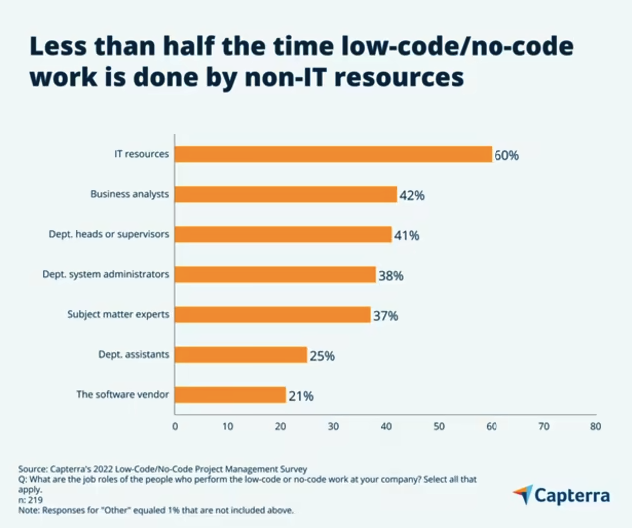AI & Citizen Development: Fueling Business Transformation beyond Cost Cutting
In today's rapidly changing economic landscape, business analysts are facing unprecedented challenges posed by inflation and economic uncertainties. Traditional cost-cutting methods are proving to be less effective, prompting the need for innovative strategies. Recognizing this need, progressive organizations worldwide are turning to AI-powered solutions and encouraging their business analysts to embrace the role of citizen developers.
The concept of citizen development empowers business analysts within companies to create customized applications and software tools that address specific business needs, bypassing the reliance on dedicated IT departments. This paradigm shift has immense potential in optimizing resource allocation, identifying cost-saving opportunities, and driving operational excellence amidst inflationary pressures.
Recently, during the CMW Lab open roundtable, industry experts gathered to discuss the advantages of integrating AI and citizen development during times of inflation. These discussions shed light on how AI-powered automation, in the hands of business analysts turned citizen developers, can revolutionize resource management, uncover cost-saving potentials, and foster operational efficiency. The panel also emphasized the significance of citizen development in fostering innovation, agility, and a sense of ownership within the workforce, empowering business analysts to spearhead transformative changes within their organizations.
The Current Macroeconomic Situation and Its Impact on Businesses
In today's rapidly changing macroeconomic landscape, businesses face a different set of challenges compared to previous crises. The focus has shifted from questions of solvency to concerns of validity and relevancy. Organizations adapt to an environment where strategies need to be responsive and decisions need to be made in the moment. And the key question becomes: How can businesses remain relevant and empower their people to provide value in the face of constant change?
While in the North American marketplace, businesses are emphasizing expense control and data security, with a shift from top-down decision-making to bottom-up demand for AI technologies and data-driven solutions, the UK has experienced a shift from negative to positive growth, but the concentration of this growth in London highlights the economic disparities caused by a mix of pandemic and Brexit factors.
Cost cutting emerges as a seemingly logical response. However, a deeper examination reveals that cost cutting alone may not be sufficient to navigate the complexities of this macroeconomic environment. Business analysts are confronted with strategic dilemmas, as decisions must not only address immediate cost reductions but also encompass long-term considerations of product relevance, workforce composition, and the integration of new technologies like artificial intelligence (AI), process automation and citizen development.
The software utilization has also evolved, requiring compatibility and value creation across different departments rather than isolated solutions for specific issues.
“Gone are the days where one department within one company has an issue and they just buy a piece of software to address that issue. Now companies are going to find the software that is able to communicate with all the existing systems and add value to the company not only in the issue that they're looking to solve, but in the other parts, like low-code BPM platforms” - commented Michael Donaghey, Director of North American Operations at CMW Lab.

Example of low-code BPM solution.
Source: CMW Lab
Current economic situation also opened up the issue of agility to many companies. A crucial aspect highlighted is the need for continuous cost management and an agile decision-making framework. Businesses that proactively manage their workforce and operational expenses, encapsulating agility within their processes, prioritize and adapt to changing market dynamics better.
Achieving Operational Excellence through Citizen Development
The rise of AI prompts executives to consider automating routine business processes while reserving human creativity for innovation and change.
Citizen development signifies a paradigm shift, democratizing the realms of coding, application development, and feature creation. By extending these capabilities to non-technical teams like business analysts, citizen development empowers employees to optimize their workflows and accomplish tasks more effectively.

Source: Capterra
But fear and lack of understanding surrounding coding deter many from embracing citizen development, highlighting the need for a transformative shift in people's mindset and work approach. 23% of businesses that are not using low-code express fear of mismanagement when handing the IT-connected processes to citizen developers, according to a Capterra survey.
So should employees fear the new technology? Experts don’t agree.
“When I think about citizen development, I think of it as a people strategy development challenge. If you keep it, 25% of the workforce, the 25% that's staying has to have some capability with that. So they have to be familiar with it. But also in terms of language things like coding, it instills fear in a number of individuals too, because people don't understand it. And what most people don't realize is many people have some of this capability already.” - said Jim Frawley, CEO at Bellwether.
The transition to citizen development and AI-based tools is comparable to the evolution witnessed with Microsoft products like Excel, where once-daunting skills became second nature in every company. By embracing this approach, organizations can tap into the untapped potential of their workforce, enabling individuals to take ownership of their work and contribute to process improvement. Overcoming initial fears and embracing citizen development and AI as a standard skill set will ultimately foster a culture of adaptability, relevance, and continuous improvement. As citizen development becomes ingrained in organizational DNA, it will empower employees to drive innovation and leverage AI, low-code and other tools, much like the revolution brought about by Excel macros in the past.
“Citizen development is a scary proposition for a lot of people and it really doesn't need to be. It is the same transition that a lot of the older generation had to go through with the Microsoft products that were developed and coming through with Excel and formulas. Now it's second nature in every company. That's a basic skill. And this is just one tool that's going to be in the toolbox, second nature five years from now.” - said Michael Donaghey, Director of North American Operations at CMW Lab.
Furthermore, citizen development empowers employees to take ownership of their work, providing them with a path to address their grievances and contribute to process improvement. It fosters a deeper understanding of the challenges faced by IT, digital, and security teams. Moreover, citizen development serves as an education tool and emphasizes the importance of maintaining the developed solutions, particularly in terms of data security and management.
“One of the key advantages of citizen development is you empower your employee to basically put their money where their mouth is. And basically, it forces employees or teams to take ownership of their own work in a much deeper way. They see the challenges and difficulties that the digital team, IT team, security team can face all the time. So it's also a great educational tool.” - said Cyril Coste, CDTO at Digital and Wealth.
New Technologies: Threat or Opportunity for Business Analysts during Inflation?
The function of business analysts in this shifting environment becomes a matter of attention as the effects of new technology on various businesses are still being contested. At the confluence of AI, process automation, and the difficulties brought on by inflation, business analysts find themselves in a critical position for comprehending market trends, interpreting data, and providing well-informed recommendations.
When utilizing new technologies, experts stress the value of a balanced approach and human participation. Others view the recent tech layoffs as a spur for adaptability and the investigation of new options in the face of inflationary pressures, while some see them as a potential danger to business analysts.
A considerable impact of AI on the employment market is predicted by Goldman Sachs, a company well known for its economic insights. AI has the potential to replace 300 million jobs in the knowledge economy, making it urgent for business analysts to reskill and upskill in order to stay relevant. Business analysts play a crucial role in navigating complex market conditions and offering insightful advice to firms as inflationary pressures impact the world economy.

The business analyst community should be ready to meet the problems and opportunities that come with the shift to AI and automation, even though it may first affect developing economies before spreading to Western countries. Business analysts must stay current on new developments in technology, pick up new skills, and modify their analytical approaches if they are to succeed in a world where automation and AI are becoming more and more important.
Experts' nuanced opinions are presented in the debate over whether new technologies can take the role of humans in high-level business decisions. While experts value the creativity and distinctive viewpoint that people bring to the table, they also acknowledge that in some circumstances, well-trained computers may successfully manage a particular sort of choice. To improve efficiency and accuracy during inflationary times, business analysts should distinguish between the decisions that benefit from human involvement and those that may be optimized by AI and automation.
In conclusion, the rise of new technologies brings both threats and opportunities for business analysts during inflationary pressures. By embracing these technologies, reskilling, and adapting their analytical methodologies, business analysts can leverage AI and citizen development to their advantage, amplifying their insights, and making valuable contributions in navigating the complexities of the business landscape during inflationary periods. It is through a combination of human expertise and the power of AI that business analysts can continue to drive informed decision-making and help organizations thrive in an evolving economic environment.
 Author: Helen Belskaya, CMW Platform
Author: Helen Belskaya, CMW Platform
Helen Belskaya is a Brand Communications Manager for CMW Platform - a BPM software by CMW Lab. Having 8+ years experience in marketing and PR Helen is empowering companies for effective completion of their business goals with marketing communications, business process management and automation.
CMW Lab is a business process automation solutions (CMW Platform) vendor, helping US businesses reach operational excellence for more than 10 years. Its flagship products gained the trust of multiple government agencies and companies such as Hertz, Aetna, CVS pharmacy. Supporting digital transformation for more than 10 years on the US market, CMW Lab products are rated #1 BPM Solutions by Gartner Peer Insights.